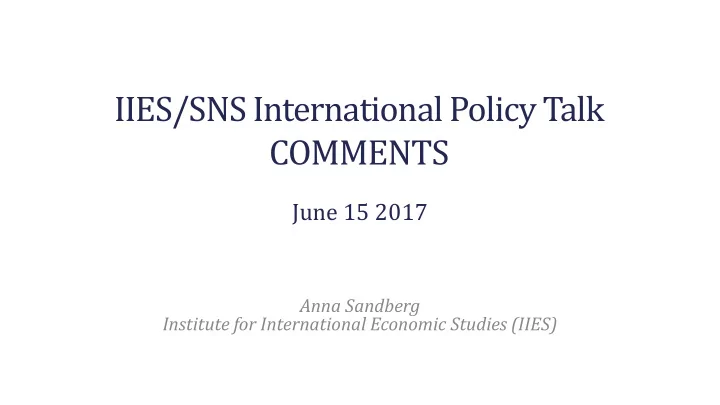

IIES/SNS International Policy Talk COMMENTS June 15 2017 Anna Sandberg Institute for International Economic Studies (IIES)
Gender gaps in negotiation behavior May account for part of the gender wage gap - Starting salaries especially important ! Increasingly decentralized wage setting individual negotiations more important - Declining rates of unionism - Sweden: larger scope for individual wage setting within collective bargaining agreements.
Evidence from Sweden Hederos & Sandberg (2012, Negotiation Journal) • Experiment • Task: Find words • Payment: 30-100 SEK
Evidence from Sweden Thank you for participating. You will receive 30 SEK in compensation. Is that OK?
Evidence from Sweden Why do men negotiate more? 50% • Better at task? NO 40% 30% • More overconfident? YES Men 20% 42,5% Women 28,1% 10% 0% Share initiating negotiation
Evidence from Sweden Säve-Söderbergh (2016): Survey of recent college graduates Did you state a salary request at the time of employment? 44 % of men 46 % of women How much did you request? Women requested 1000 SEK less per month How much did you receive? Conditional on the request, women received less
Backlash What if men and women who behave the same …. I want I want more more … are not treated the same? He’s a go-getter! She’s too aggressive…
Backlash • May be socially costly for women to be assertive and self-interested in a negotiation. • Why? Violates prescriptive gender stereotypes: MASCULINE FEMININE agentic breadwinner selfless caretaker The “competent vs. likable” dilemma
Questions • Do women risk being punished for saying “no” to non - promotable tasks ? (or for being competitive?) • Do women fear social backlash for saying “no” to non - promotable tasks? (or for being competitive)? • What is the link between gender gaps in negotiation behavior and gender gaps in accepting non-promotable tasks? Similar driving forces?
Recommend
More recommend